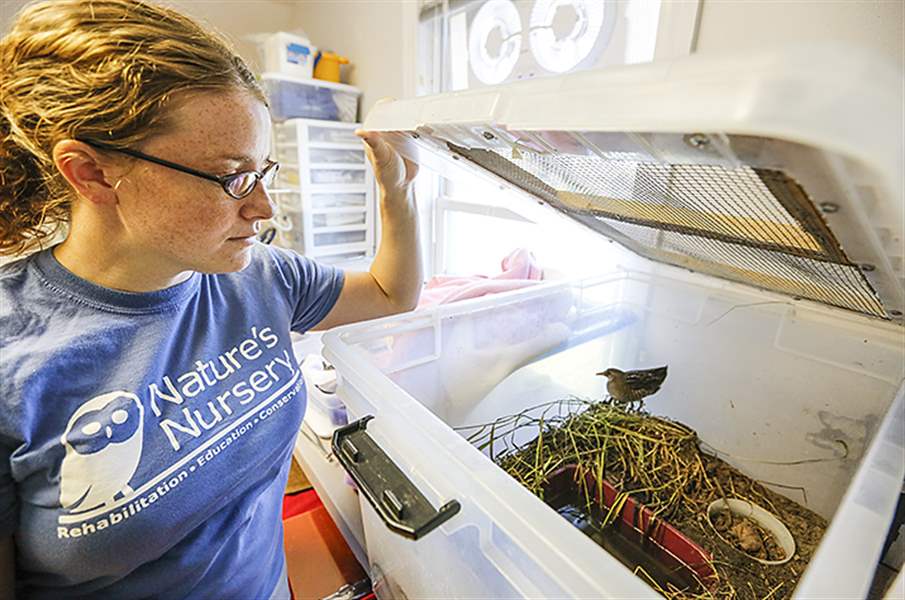
Wildlife center faces budget crunch after increase of animals in care
8/29/2016
Kerri DeShetler, operations coordinator at Nature’s Nursery in Whitehouse, checks on a sora on Friday. The center has taken in about 2,100 animals so far this year.
THE BLADE/ANDY MORRISON
Buy This Image
The local wildlife rehabilitation center is working through an intense budget squeeze this summer after an influx of animals needing medical care.
“We’re living hand-to-mouth this time of year, for the most part,” said Steven Kiessling, executive director of Nature’s Nursery Center for Wildlife Rehabilitation and Conservation Education near Whitehouse. “This time of year stinks when it comes to fund-raising in general.”
While the nonprofit budgets carefully, there’s no way to predict what cases will come through the door or how much donors will be able to help. Planning for in-kind donations such as discounted veterinary fees and donated or reduced-cost feeder mice is particularly difficult, Mr. Kiessling said.
The center has taken in about 2,100 animals so far this year. In just the last month, the center has received 20 birds of prey — also known as raptors.
“There’s no rhyme or reason,” Mr. Kiessling said. “Some days, we’ll get four or five big birds at one time. Then we won’t get any for a week.”
Caring for raptors is financially demanding. Not only are they generally more costly to feed, but their recovery times are often lengthened because each must be housed individually as they work through the various steps of rehabilitation.
“They have to kind of wait in this queue to get to the next step,” Mr. Kiessling said. “And they get room and board while they wait.”
A bald eagle released Aug. 22 cost the center about $1,500 after eye and wing injuries. The cantankerous bird actually re-injured his wing in a flight cage, extending his stay to 11 weeks.
“He was here for quite a while and not at all happy about it,” said Laura Zitzelberger, director of operations. “For him, it was the length of the stay and the initial medications and vet care.”
Another bald eagle that is unable to fly is currently undergoing diagnostic tests. X-rays didn’t show any fractures, so blood work will be done.
“Some of the birds we get in and out in a couple of weeks,” Mrs. Zitzelberger said. “Some of them will be with us six months to a year depending on what’s going on.”
A great blue heron with a fractured wing is gobbling up mice and smelt fish at an impressive rate. It eats 10 to 15 mice and 15 to 30 smelt each day.
“The heron will get to be quite expensive because of the volume of food it eats,” Mrs. Zitzelberger said. “This guy luckily has a fracture that should heal on its own.”
She estimates the heron will be at the center for three to four weeks, costing the center $850 to $1,000.
Other recent cases with higher costs include a barred owl with a head injury, two orphaned baby minks, and a few labor-intensive baby hummingbirds that require a very special — and expensive — formula. A number of very sick great horned owls also passed through, although most of them died soon after arriving of suspected West Nile virus.
“It all adds up,” Mrs. Zitzelberger said.
Donations to Nature’s Nursery may be made at natures-nursery.org, or by sending a check to P.O. Box 2395, Whitehouse, OH, 43571.
Contact Alexandra Mester: amester@theblade.com, 419-724-6066, or on Twitter @AlexMesterBlade.